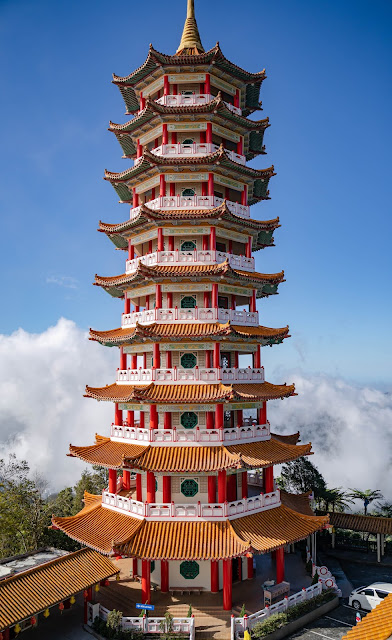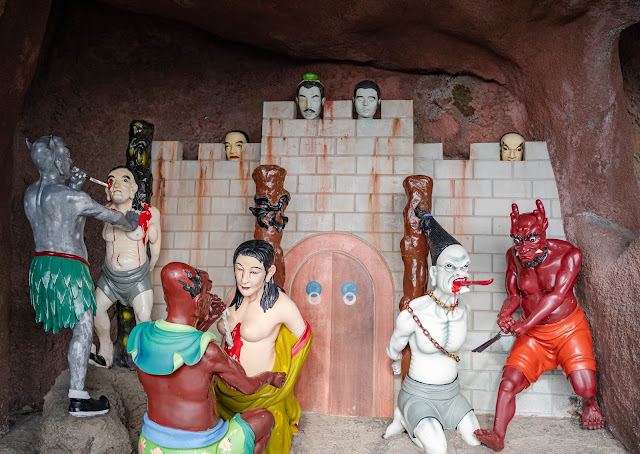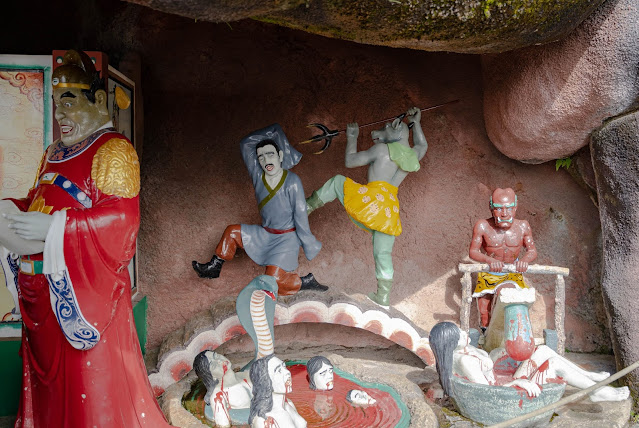The Chin Swee Caves Temple is one of the most scenic attractions in Genting Highlands. The temple was officially opened on 29 March 1994 after the completion of Genting Highland Resort in 1975.

Built on a 28-acre plot of rocky forested land donated by Genting Group founder the late Lim Goh Tong. You can see the moving white clouds and a magnificent view of the majestic Titiwangsa mountains here, it's just beautiful.

How To Get There
- The temple is around 10 minutes drive from Resorts World Genting.
- Take the Awana Skyway cable car that disembark at Chin Swee Station and there are connecting escalators to take you down to the temple.








Nine Colour Dragon Wall of Luck
This is located at the temple grounds upon entrance - Dragon, also known as 'Long' in Chinese is a symbol of power, strength, and good luck. Each of the nine dragons have different color representing a special type of luck.

Pagoda
Inside the pagoda are 10,000 blessing lamps installed for devotees of the temple to dedicate to those that they would like to be blessed by Buddha. You can take the spiral stairs to reach the top of the pagoda as well.

Buddha Temple


Statue of Tan Sri Lim Goh Tong

Guan Yin Statue

Chin Swee Wishing Board

8 Fairies

18 Immortals
The 18 Immortals or 'Shi Ba Lohan' are divine characters in Buddhism known as the original followers of Buddha who have reached the state of Nirvana and they do not need to go through reincarnation.

Laughing Buddha
Laughing Buddha brings good luck, contentment and abundance in one's life.

Statue of Buddha
The meaning of the swastika symbol on Buddha's chest - Horizontal line unites light and darkness; Perpendicular line symbolically connects heaven and earth. These two combined, form a cross representing the universe in harmony beyond the limits of time and space.
Bridge of Fairies
Xi Wang Mu grows peaches of immortality in her Heavenly Garden that only ripe once every 3000 years. An extravagant banquet called the "Feast of Peaches" were held for deities to savor the peach for longevity.
God of Fuk-Luk-Sau
The three gods of wealth are Fuk (Luck), Luk (Wisdom) and Sau (Longevity).
Journey to The West
The Monkey King or Sun Wukong can only be controlled by a magic gold ring that Guanyin placed around his head, which causes him unbearable headaches when Tang Sanzang read the sutra.
The Bodhisattva Kslitigarbha

Ten Chambers of Hell
According to Buddhist believes, your life will be reviewed after death to decide your fate. A good person would be sent for rebirth while an evil person would be sent to the chambers of Hell to review his/ her wrong doing and the penalties for that action.
First Hell Chamber: Qin Gung Wang
Manages the book of birth and death of human realm - Qin Gung Wang will determine if you would be sent for rebirth or the chambers of hell.
Second Hell Chamber: Chu Jiang Wang
To punish kidnappers, malpractice doctors & those who commit suicide will be punished here after death.
Third Hell Chamber: Song Di Wang
The controller of the Black-Line Hell - To punish those who disobeyed seniors, dishonest, disloyal, immoral, harmed others for self benefit, escaped from prison & thieves.

Fourth Hell Chamber: Wu Guan Wang
The controller of the Rounding-Up and Crushing Hell - To punish those guilty of tax evasion, bullying, negligence of elderly and poor, pretended & misused the influences of worldly gods.
Fifth Hell Chamber: Yan Luo Tian Zi
The controller of the Howling Hell - To punish those who violated the correct principle, haggled over fame and fortune, raped, murder, gambler & was jealous of the kind hearted.
Sixth Hell Chamber: Bian Cheng Wang
The controller of the Great Howling Hell - To punish those who disregarded sutras and its teaching, disrespect Buddha and other worldly gods, committed vandalism & food wasters.
Seventh Hell Chamber: Tai Shan Wang
The controller of the Heating Hell - To punish those involved in trafficking, abortion gambling and other dishonest activities.

Eighth Hell Chamber: Du Shi Wang
The controller of the Intense Heating Hell - To punish those who did not practice filial piety & caused sadness to their parents and in laws.

Tenth Hell Chamber: Zhuan Lun Wang
This chamber is for those who are going for reincarnation. The controller will decide whether you will be reborn into human, animals or creatures based on merits and demerits of your past life.




Goh Tong Hall





















Comments
Post a Comment